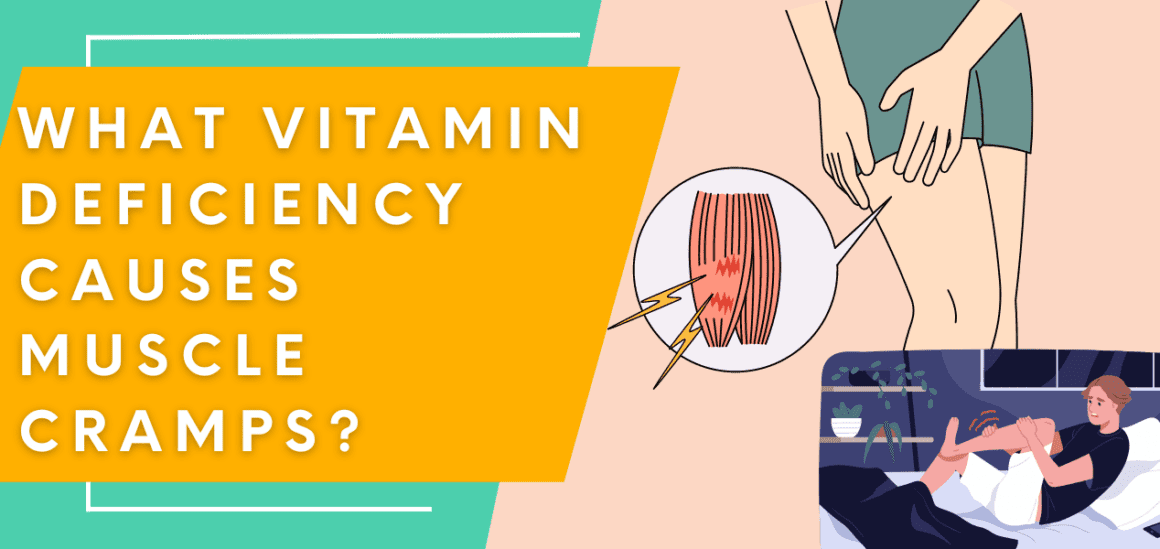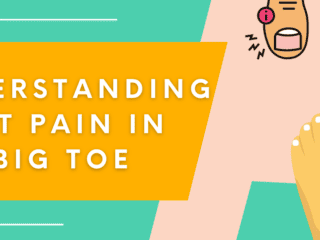Painful muscle cramps, especially in the legs, can put you in the most uncomfortable situations, often at the worst time possible, like exercising or sleeping. These could be linked to various risk factors like lifestyle or health issues, like a lack of vitamins in the diet.
Today’s piece will tackle what vitamin deficiency causes muscle cramps and discuss how to work over them.
What Vitamin Deficiency Causes Muscle Cramps?
Factors That Cause Muscle Cramps
Muscle cramps are involuntary and uncontrollable contractions that can affect any of your muscles involving part or all of a muscle or several muscles in a group. While generally harmless, the cramps can make it temporarily impossible to use the affected muscle.
The most common sites for muscle spasms are the thighs, calves, feet, hands, arms, and abdomen. It can even happen at night when you’re at rest or asleep (nocturnal leg cramps).
- Inadequate blood supply – Narrowed arteries that deliver blood to the legs can produce a cramp-like pain in the legs and feet while exercising, called claudication. This pain occurs in the legs after walking at a certain pace and for a certain amount of time, usually going away soon after resting.
- Nerve problems – If the nerves in your spine become compressed, they can produce cramp-like pain in your legs, which worsens the longer you walk. A pinched nerve or spinal cord injury can also cause nerve compression and lead to muscle cramps.
- Lifestyle/health habits – Long periods of exercise or physical labor, particularly in hot weather, can lead to muscle cramps. You might be at higher risk of muscle cramps if you have diabetes or nerve, liver, or thyroid disorders.
- Dehydration – The muscles require plenty of water and electrolytes to function well. Without enough fluid, they become extremely sensitive and spasm or contract involuntarily.
- Age – As people grow older, they begin to lose muscle mass. The tendons (the tissues that connect your muscles to your bones) naturally shorten as you age, causing the remaining muscle to become overstressed more easily.
Vitamin & Mineral Deficiencies That Can Cause Muscle Cramps
Not having the recommended daily amount (RDA) of vitamins and minerals in your diet could lead to leg cramps, particularly the following:
Calcium Deficiency
Calcium is an important mineral most often associated with healthy bones and teeth by helping muscles to contract and regulating normal heart rhythms and nerve functions.
And since calcium helps with muscle contractions, not having enough of it means you might be more to have muscle cramps, particularly in the back and legs. It can cause tingling in arms and legs and make you more prone to bone-related injuries.
Acute hypocalcemia can result in more severe symptoms that require hospitalization. Other symptoms aside from muscle cramping include muscle spasms, tetany, circumoral numbness, and seizures.
Magnesium Deficiency
Magnesium is needed for muscles and nerves to work properly, maintain blood sugar and blood pressure levels, and produce protein, bone, and DNA. Studies show that low magnesium levels over time can lead to low calcium and potassium levels.
And since magnesium plays a role in neuromuscular transmission and muscle contraction, it has been thought that low magnesium can make one more prone to muscle cramps since magnesium deficiency lowers the electrical threshold, making the nerve cells depolarized and hyper-excitable.
Potassium Deficiency
An important mineral found naturally in many foods, the main role of potassium in the body is to help maintain normal fluid levels inside the cells, and together with sodium, maintains normal fluid levels outside of cells. It helps muscles to contract and supports normal blood pressure.
Experiencing muscle cramping or twitching due to potassium deficiency is a rare occurrence. Though in severe cases of potassium deficiency (hypokalaemia), these side effects become more apparent and manifest themselves more frequently
Vitamin D Deficiency
Vitamin D is an important fat-soluble vitamin that helps the body absorb and retain calcium and phosphorus – both important minerals integral to the bone-building process. It promotes muscle protein synthesis and increased exercise capacity and physical performance.
Common Symptoms of Vitamin Deficiencies
Vitamin deficiencies manifest themselves in the following symptoms:
- Fatigue & weakness – Deficiencies in certain nutrients and minerals such as may cause fatigue and diminished energy, affecting one’s physical performance.
- Pale/yellowish skin – Folic acid, or vitamin B-9, helps the body produce red blood cells, and a lack of folate in your diet can also lead to a loss of skin pigmentation, resulting in pale or sometimes yellowish skin. It also affects healthy nail and hair growth.
- Shortness of breath – Anemia that results from vitamin B-12 deficiency may cause a person to feel breathing problems or dizziness.
- Muscle loss – Lacking vitamins C, D, and E can lead to muscle wasting in both animals and humans. Unintentional or rapid weight loss can stem from long-standing nutritional deficiencies or inadequate diets.
- Irregular heartbeats – A lack of calcium, magnesium, and vitamin D can cause an irregular heartbeat. Vitamin D levels affect the amount of calcium the body absorbs, generating electronic impulses and muscle contractions that regulate heartbeats.
- Irregular periods – One study found that low vitamin D levels could be linked to irregular periods. A lack of B-complex vitamins could also impact thyroid hormone production.
- Cognitive problems – Not having enough vitamin B12 in the body can negatively affect one’s brain function, particularly processing speed, mental shifting, and information updating.
- Mental health problems – Vitamin B deficiency can disrupt the nervous and circulatory system and trigger mental health problems like depression, anxiety, and mood swings.
Causes of Vitamin Deficiencies
Vitamin deficiencies stem from various health factors and even lifestyle habits like:
Inadequate dietary intake
Fruit, vegetables, grains, meat, poultry, and seafood contain a whole variety of nutrients and minerals. Some vitamins are found in more than one type of food, and some foods are fortified with vitamins.
Certain diets, no matter how healthy they may be, can sometimes cause vitamin deficiency. For example, a gluten-free diet can make you deficient in many vitamins, including folate, thiamine, iron, magnesium, calcium, and zinc which are naturally found in grains. Those who eat too many processed foods and not enough fresh fruits and vegetables lack vitamins E and K.
People who follow a vegan or vegetarian diet tend to lack protein, vitamin B12, and biotin since these nutrients are more commonly found in meat and animal products. Those who avoid dairy- could be at risk of vitamin D deficiency and other nutrients like calcium, riboflavin, and phosphorus.
Nutrient malabsorption
In some cases, people may eat enough healthy diets and still won’t feel any results due to nutrient malabsorption, which is the small intestine’s inability to absorb nutrients, leading to things like indigestion and malnutrition.
Health problems like those related to the intestine, such as Celiac disease, Crohn’s disease, and pancreatitis, can affect the body’s ability to absorb important nutrients.
Chronic illnesses
Experts say that vitamin deficiencies are important risk factors for chronic diseases like cardiovascular disease, cancer, and osteoporosis. Others believe that insufficient vitamin intake is an effect of chronic diseases.
Kidney, liver, and digestive diseases can also hinder nutrient absorption, leaving patients vulnerable to other conditions and health risks.
Diagnosis and Treatment
While the symptoms above may manifest frequently, they don’t always signify a specific vitamin deficiency and could point out other health conditions, so the best way to confirm is to consult a healthcare provider to guide you through testing options.
Blood tests
A complete blood count is the most common screening test and can confirm the signs of vitamin deficiency and determine your vitamin levels.
Both finger-prick and venous blood tests are done to collect blood samples. You can also do a finger-prick test by yourself using a lancet to prick your finger to collect a sample.
Dietary changes
Ask a trusted dietitian or healthcare provider to guide you through which foods contain the vitamins you need, or ask for a specific meal plan. Long-term dietary changes can help correct and prevent nutrient deficiencies.
Taking nutrient-specific nutritional/dietary supplements is also a good way to help fill nutritional gaps. Your doctor may prescribe an over-the-counter (OTC) or a prescription supplement.
You can also do these steps at home:
- Avoid dehydration – Drinking plenty of liquids daily helps your muscles contract, relax, and keep muscle cells hydrated and less irritable, especially during and after physical activity. Nutritionists recommend drinking up to 8 glasses of water a day.
Caffeine and alcohol may trigger cramping episodes, so it’s best to avoid them for a while.
- Stretch the muscles – Before doing any exercise or intense physical activity, it’s important to stretch the muscles before and after, especially the affected parts. If you tend to have leg cramps at night, stretch before bedtime. Walking around can also relieve some pain.
Conclusion
Muscle cramps can occur at any time to anyone, whether you’re old, young, passive, or active. It can happen when you’re walking, exercising, sitting, or even sleeping. They may be unpredictable and inconvenient, but they’re manageable enough to treat and relieve.
If symptoms worsen, consult your healthcare provider to discuss the best treatment options.
Disclaimer: this article does not constitute or replace medical advice. If you have an emergency or a serious medical question, please contact a medical professional or call 911 immediately. To see our full medical disclaimer, visit our Terms of Use page.
Related Posts
What Vitamin Deficiency Causes You To Crave Salt?








